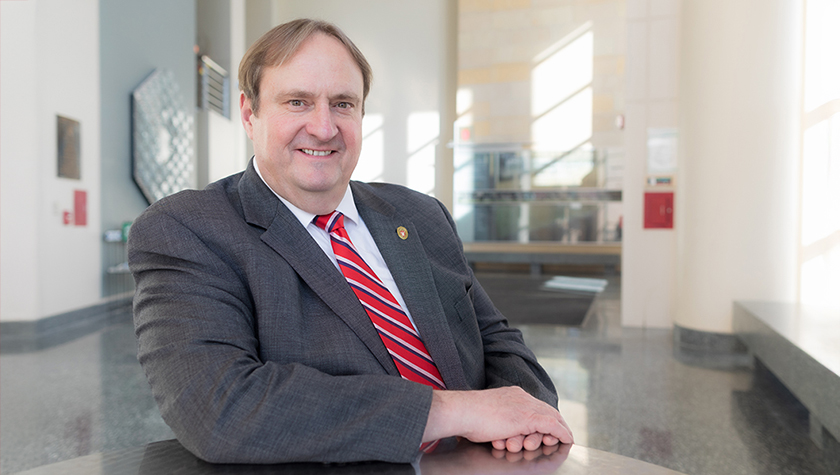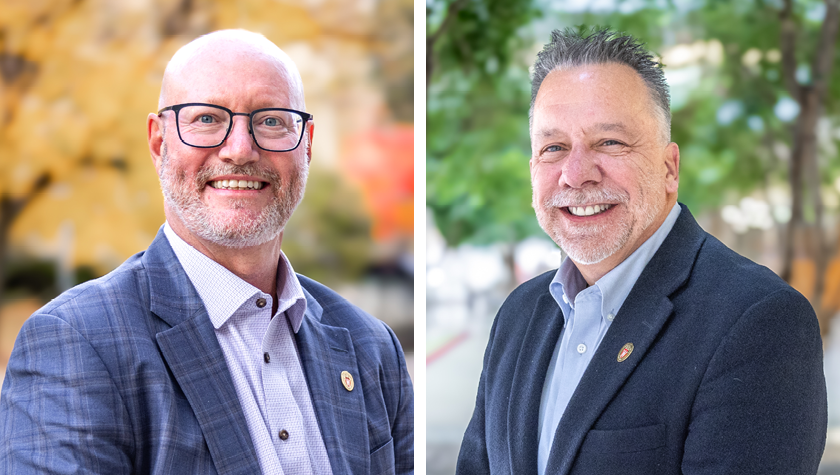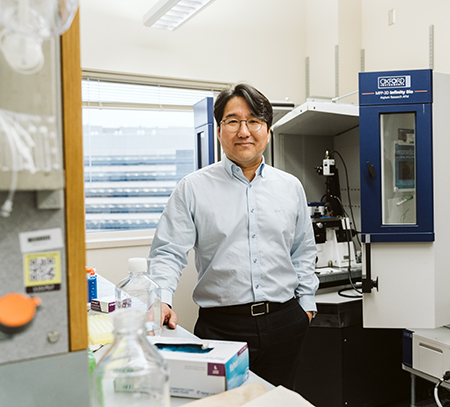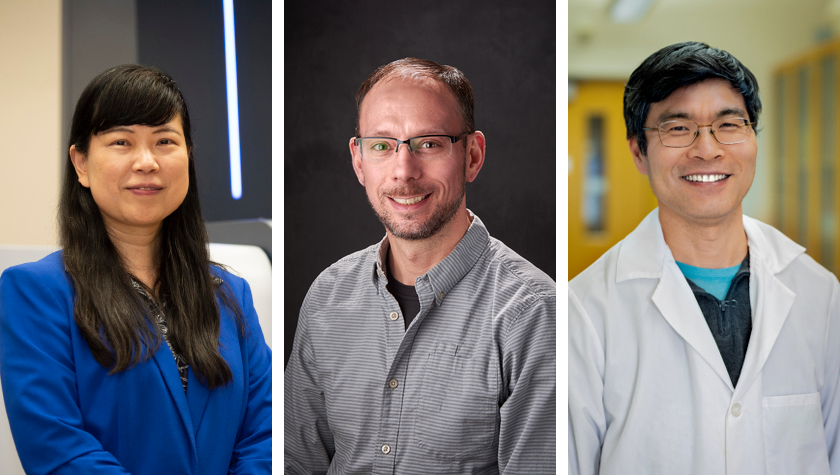
We are one of the premier pharmacy schools in the country. The most important reason for this is our people: our innovative faculty, dedicated staff, talented students, and powerful alumni. But just like any top organization, to stay at the vanguard we must constantly evolve our strategies, develop our skills and remain dedicated to our mission and values. Today I will highlight a few important things happening at the University of Wisconsin–Madison School of Pharmacy (SoP) to help propel us forward.
Expert advisors

This fall, our Board of Visitors welcomed two new members: Steve Rough (BS ’91, MS ’94), MS, RPh, FASH and Greg Primuth (BS ’88), RPh, MBA. Steve is the CEO of Visante, which was founded by SoP alumnus and past board member Michael Flagstad (BS ’74, MS ’76). Visante is a specialized consulting firm focusing on pharmacy operations to help health systems perform efficiently and effectively. Steve’s broad national perspective on health systems operations will help us train students prepared for modern clinical pharmacy. As the senior director of pharma strategic initiatives at Walgreens, Greg provides us with a high-level perspective from the C-suite of one of the world’s leaders in retail pharmacy. Steve and Greg join a board comprised of leaders in pharmacy and pharmaceutical sciences who are passionate about the SoP and visionaries in their respective fields.
Hiring new faculty
UW–Madison is pursuing an ambitious new program through the RISE (Research, Innovation, and Scholarly Excellence) Initiative. The plan is to hire somewhere around 120 to 150 new faculty members at the university over the next three to five years. This would be about 40% more faculty than we would otherwise bring to campus over that time frame. The funding will come from the increased revenue that the university brings in with the record class sizes in recent years, the highest-ever research productivity of our faculty (see below), industry partners, the Wisconsin Alumni Research Foundation (WARF), and philanthropic supporters.
There are currently three RISE initiatives. RISE-AI (artificial intelligence) will focus on recruiting faculty who will help us realize the tremendous potential that AI has for improving the human condition and develop guardrails for AI’s potential risks. The RISE-EARTH initiative will focus on recruitment of faculty who can reimagine economic and environmental systems and who will build sustainable energy and technical systems. Finally, RISE-THRIVE recruits will strengthen our campus’s efforts in immunology and healthspan (the number of years not only alive but healthy).
We in the SoP expect to hire a total of four new faculty in the AI and THRIVE categories: two in the upcoming academic year (2025-2026) and two more in 2026-2027. Searches are currently ongoing for faculty in our divisions of Pharmaceutical Sciences for a medicinal chemist and Social and Administrative Sciences for a scholar in the economics of pharmacy.
Diversifying our research portfolio
Since 1972, when research activity was first surveyed by the National Science Foundation, UW–Madison has ranked among the top 10 of U.S. colleges and universities. The most recent ranking, released November 25, 2024, has us in sixth place with over $1.73 billion in annual research expenditures. Part of the UW plan to move up in the rankings involves hiring new faculty in the key areas described above. Another part of the strategy is to tackle big, challenging problems that require multidisciplinary approaches to solve. Our research efforts have traditionally been led by small teams composed of one or two faculty members. However, in recent years, our faculty have been joining forces to create larger interdisciplinary teams capable of solving highly complex problems requiring a wide range of expertise and experience.

A recent example of this collaborative approach is a new $11 million grant from the Congressionally Directed Medical Research Programs administered by the Department of Defense. Professor Seungpyo Hong, director of WisCNano in the SoP, has teamed up with Allan Brasier, director of the UW Institute for Clinical and Translational Research, to study cell-matrix interactions that contribute to the development of idiopathic pulmonary fibrosis, a progressive and debilitating lung disease that kills an estimated 40,000 people every year in the U.S. The multidisciplinary team also includes Nathan Sandbo, director of the UW Health Interstitial Lung Disease Program; Paul Campagnola, professor and chair of the Department of Biomedical Engineering; and Lynn Schnapp, professor and chair of the Department of Medicine.
At the campus level, the Office of the Vice Chancellor for Research has created the Research Forward Initiative, which is designed to support highly innovative and groundbreaking research that requires a team effort. The program funds collaborative, multidisciplinary teams of scientists led by senior faculty with outstanding track records. Successful proposals will demonstrate the potential to open up pathbreaking new research avenues or fundamentally transform a field of study.

Several of our faculty have been awarded funding for their interdisciplinary proposals. Professor Tim Bugni is leading a team of faculty from the SoP and the School of Medicine and Public Health (SMPH) to understand how some antibiotics can modulate immunity and can kill pathogens despite having no direct antimicrobial activity in vitro. The goal of the project is to understand the interplay of antibiotics, the immune system, and pathogens. Professor Lingjun Li is using state-of-the-art mass spectrometry approaches to study the molecular changes that occur in the microenvironment of the Islets of Langerhans during progression of diabetes. Finally, Professor Weiping Tang is collaborating with faculty experts in theoretical chemistry and machine learning to create a deep-learning artificial intelligence platform that learns from patterns in chemical environments using known protein structures that regulate protein-protein interactions. Identifying such interactions is critical for developing therapies against so-called “undruggable” proteins involved in a host of diseases.
This is how we stay at the vanguard of research and education. We never stop innovating, always support each other, and are ever moving forward.
On, Wisconsin!
Steven M. Swanson
Dean and Professor